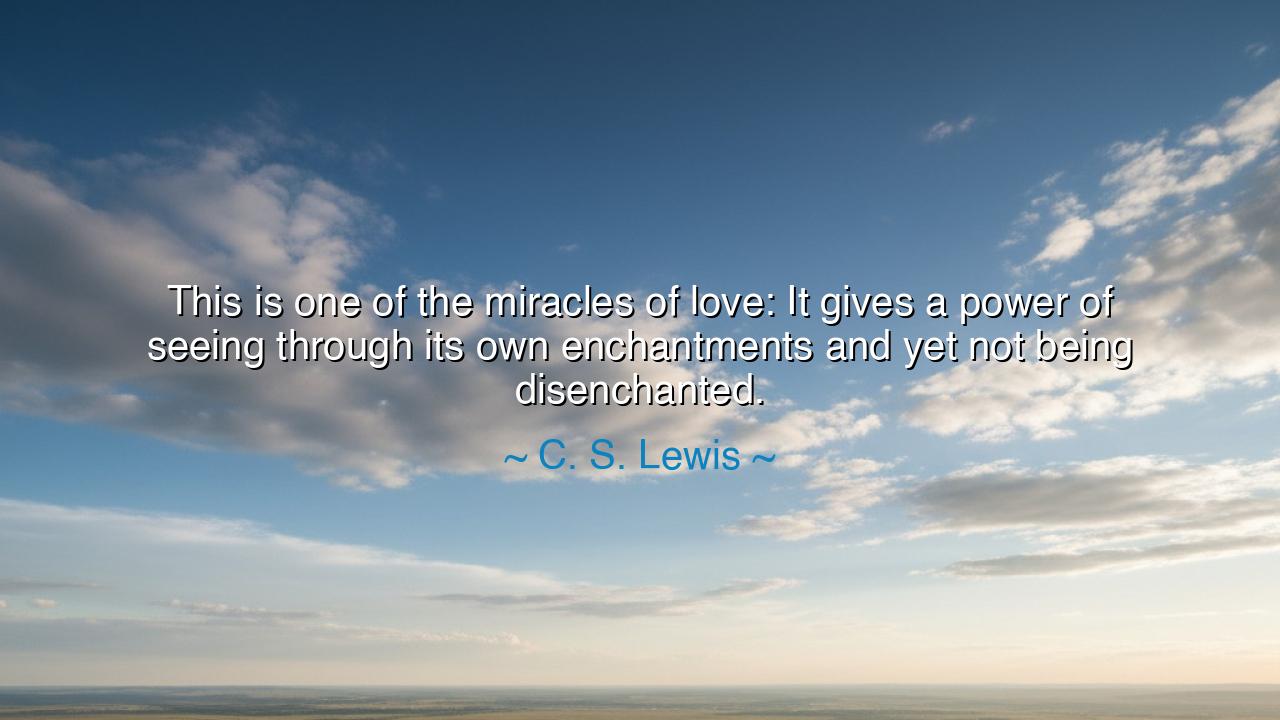
This is one of the miracles of love: It gives a power of seeing
This is one of the miracles of love: It gives a power of seeing through its own enchantments and yet not being disenchanted.






The Christian philosopher and storyteller C. S. Lewis once declared: “This is one of the miracles of love: It gives a power of seeing through its own enchantments and yet not being disenchanted.” In this profound saying, he unveils the paradox of love—that it enchants us with wonder, beauty, and desire, yet even when we see its imperfections, its frailty, and its illusions, we do not cease to believe in it. For love is not destroyed by truth; it is strengthened by it.
The origin of this wisdom lies in Lewis’s reflections on both earthly and divine love. He knew, as a man who had tasted friendship, romance, and loss, that love is never flawless. Yet unlike other passions that wither when exposed to reality, love alone survives disillusionment. It allows the lover to see the cracks in the vessel and yet continue to treasure it. This, Lewis calls a miracle, for it belongs not to reason alone, but to the deeper mystery of the heart and of God.
History bears witness in the story of Antony and Cleopatra. Their love was no mere dream; it was shadowed by politics, betrayal, and looming war. Yet though Antony saw the costs, though he knew the dangers, his heart remained bound. He saw through the “enchantment” and yet was not “disenchanted.” Their tale, though tragic, reveals the enduring force Lewis speaks of: the power of love to outlast even the revelation of its own illusions.
The ancients too recognized this paradox. The Greeks sang of Odysseus and Penelope, who after twenty years of separation and trial, loved not as idealized figures but as weathered souls. Odysseus returned not a young hero but a scarred man, and yet Penelope, seeing him clearly, loved him still. Their union was not the enchantment of youth, but the miracle of enduring affection that persists through reality’s harsh light.
Therefore, O seekers, learn this truth: the greatness of love is not that it blinds us, but that it allows us to see and yet still choose. It is a fire that survives the storm, a bond that remains even when illusions fall away. To love is to embrace the enchantment while knowing it is enchantment, and yet never ceasing to marvel. This is the miracle of love—that truth does not kill it, but only deepens its glory.






NNNi Nguyen
C.S. Lewis’ words make me reflect on the idea of love being both rational and magical at the same time. It’s incredible that love can reveal so much about a person, yet still retain its beauty and wonder. But is it always this way, or does love eventually lose its enchantment once we see too much of the other person’s flaws? I wonder if the ‘miracle’ of love changes as we grow older or more experienced in relationships.
AN31-Do Thi Anh Nhi-9E
This quote really speaks to the complexity of love. It suggests that true love doesn’t just involve an idealized view of someone but also a clear recognition of their imperfections. How can we balance seeing someone for who they truly are while maintaining that feeling of enchantment? Does this capacity to stay enchanted mean we’ve accepted the person fully, flaws and all, or is there an element of mystery that remains?
UGUser Google
I love the idea that love allows us to see through its own enchantments without losing the magic. It makes me think about how love isn’t blind, as some might say, but rather enlightened. Does this mean that true love requires an acceptance of imperfection? How do we maintain that enchantment without idealizing someone too much? It seems like there’s a fine line between seeing someone clearly and keeping them in that enchanted light.
BHbao han
C.S. Lewis captures something profound about love in this quote. It’s fascinating how love can provide clarity and still keep us enchanted with the person we care for. How is it possible to see someone’s flaws and yet continue to love them deeply? I wonder if this ability to see clearly yet remain enchanted is unique to romantic love or if it applies to other types of deep affection as well.